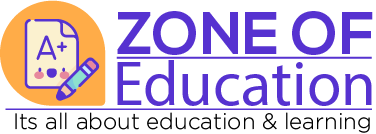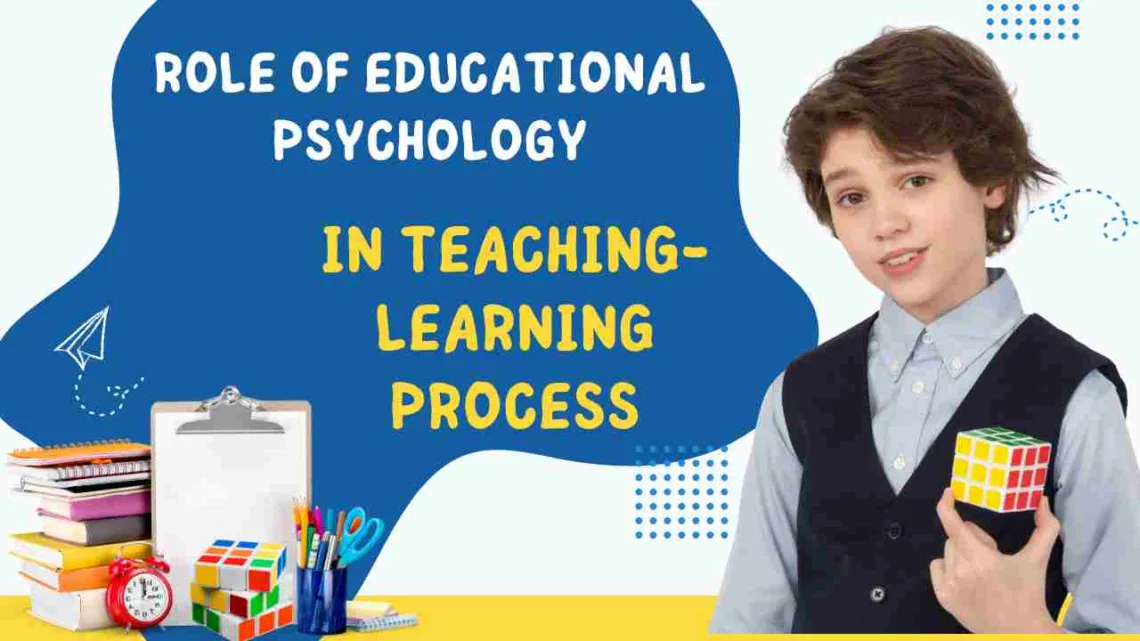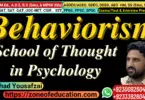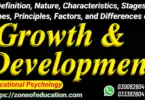The Role of Educational Psychology in the Teaching-Learning process is crucial as Educational Psychology does not treat teaching and learning as separate from each other. They are seen as closely related, mutually inclusive, interactive aspects of education. Educational psychology plays a vital role in making teaching-learning effective.
Educational psychologists examine several theories and techniques for learning skills and problem-solving.
Educational psychology helps teachers to impart the subject matter to the students effectively. The teacher requires mastery over the subject matter and command over methods of teaching to effectively communicate and manage students in a classroom.
A teacher must have adequate and sound knowledge of different theories and principles of teaching and learning to achieve better results in the teaching–learning process.
In education, where the dynamic interplay between teachers and students forms the cornerstone of the teaching-learning process, the role of educational psychology emerges as a guiding force, shaping effective pedagogy. Unlike disparate entities, teaching and learning are intricately intertwined, mutually dependent facets of education, and it is within this nexus that educational psychology thrives, breathing life into the educational endeavor.
The role of the teacher extends far beyond the mere dissemination of information. A proficient teacher is not merely a knowledge transformer of facts and figures but a facilitator of learning, a catalyst for intellectual exploration. To fulfill this noble role, teachers must possess a multifaceted skill set, encompassing not only a mastery of the subject matter but also a profound understanding of the principles and techniques of pedagogy. It is here that educational psychology assumes its pivotal role, equipping educators with the tools and knowledge necessary to navigate the complex terrain of the classroom.
Central to the efficacy of teaching is the ability of educators to effectively communicate the subject matter to their students. Educational psychology offers valuable insights into the mechanisms of learning, shedding light on the diverse cognitive processes involved in knowledge acquisition. Understanding the intricacies of memory, attention, and comprehension, teachers can implement their instructional strategies to meet the needs and capabilities of their students, ensuring that learning transcends mere rote memorization and engages the intellect on a deeper level.
Moreover, educational psychology serves as a beacon of guidance for educators, offering a repertoire of proven methodologies and techniques designed to enhance the teaching-learning process. From the scaffolding approach of Vygotsky to the behaviorist principles of reinforcement, educators draw upon a rich tapestry of pedagogical theories to craft engaging and effective instructional experiences. Incorporating these evidence-based practices into their teaching repertoire, educators can create dynamic learning environments that foster active engagement, critical thinking, and meaningful learning outcomes.
Beyond the theory lies the practical application of educational psychology in the classroom. A proficient teacher is not only well-versed in pedagogical theory but also adept at translating these theoretical insights into tangible teaching practices. Through the lens of educational psychology, educators gain a deeper understanding of classroom dynamics, student motivation, and instructional design, enabling them to create learning experiences that resonate with the diverse needs and learning styles of their students.
Furthermore, educational psychology empowers educators to adopt a proactive approach to classroom management, fostering a positive and conducive learning environment. Leveraging principles of behavior modification and socio-emotional learning, teachers can cultivate a classroom culture characterized by mutual respect, collaboration, and intrinsic motivation. In doing so, they lay the foundation for academic success and holistic development, nurturing not only the intellect but also the social and emotional well-being of their students.
The role of educational psychology in the teaching-learning process cannot be underestimated. As a guiding force in the field of education, it empowers educators to explore the full potential of their students, facilitating a transformative journey of intellectual growth and personal development. Equipping educators with the knowledge, skills, and insights necessary to navigate the complexities of the classroom, educational psychology paves the way for a future where every learner has the opportunity to thrive and flourish.
Understanding the Learner
Teachers are to understand students, their behavior, their level of understanding, their growth & development, and their psychology. The study of psychology is imperative for a teacher to function as a behavioral scientist to understand the influence of the school environment on children’s behavior, and to have a deeper and critical understanding of the educational process.
Understanding the learner is important for teachers as it forms the cornerstone of effective pedagogy. Comprehending the intricate nuances of students’ behavior, cognitive development, and psychological makeup, educators can align their instructional approaches to meet the diverse needs of learners and foster optimal learning outcomes.
In understanding the teacher’s concern lies a deep appreciation for students’ differences, including their cognitive abilities, learning styles, interests, and socio-cultural backgrounds. Recognizing and valuing these differences allows teachers to design instruction that is responsive, inclusive, and engaging, ensuring that every student has the opportunity to succeed academically and thrive personally.
Moreover, understanding the learner entails a nuanced understanding of students’ growth and development across various domains, including cognitive, social, emotional, and physical development. Being attuned to the developmental stages and milestones that students traverse, educators can scaffold learning experiences that are developmentally appropriate and supportive of students’ evolving needs and capabilities.
Understanding the learner in educational psychology serves as a foundational framework for comprehending the intricacies of human learning and behavior within educational contexts. Drawing on principles and theories from educational psychology, teachers can gain insights into the factors that influence students’ motivation, engagement, and academic achievement, guiding their instructional decisions and classroom practices.
Understanding the learner empowers teachers to function as behavioral scientists, adept at analyzing the influence of the school environment, classroom dynamics, and instructional strategies on students’ behavior and learning outcomes. By critically examining the interplay between environmental factors and student behavior, educators can create supportive learning environments that foster positive social interactions, emotional well-being, and academic success.
Understanding the learner is foundational to effective teaching and student-centered pedagogy. With a deep understanding of students’ behavior, growth, development, and psychology, teachers can create learning experiences that are meaningful, relevant, and transformative, paving the way for every student to reach their full potential and become lifelong learners.
Understanding Instructional Problem
Educational psychology facilitates a teacher to understand instructional problems and to promote learning in and out of classrooms. A teacher has to provide guidance and counseling to students. The intensive study of educational psychology adequately equips a teacher with skills in guidance and counseling. A teacher must know the growth and development of a child and his or her requirements at different stages of development. The child is the central theme in educational psychology. The main concern of an educational psychologist is how a child learns effectively, what changes happen in a child as a result of learning, why a child learns what motivates a child to learn and change, what a child wants to learn, and why. There is always the same concern of an effective teacher.
Understanding instructional problems is crucial for educators to effectively promote learning and address challenges in both classroom and non-classroom settings. Educational psychology provides valuable insights and tools to help teachers identify and tackle instructional issues, ultimately enhancing the learning experience for students.
As educators, our primary goal is to guide and support students in their learning journey. Educational psychology equips us with the necessary skills to provide guidance and counseling to students, helping them navigate academic challenges, set goals, and develop strategies for success. Understanding the principles of guidance and counseling teachers can create supportive learning environments that foster student growth and well-being.
A fundamental aspect of understanding instructional problems is recognizing the importance of child development. Every child is unique, and their educational needs evolve as they progress through different stages of development. With the understanding of child growth and development, educators plan their instructional approaches to meet the changing needs of students, ensuring that learning experiences are developmentally appropriate and engaging.
In educational psychology, the child is at the forefront of our concerns. We strive to understand how children learn effectively, what factors influence their learning, and what motivates them to engage in the learning process. By gaining insight into the cognitive, social, emotional, and behavioral aspects of learning, we can design instructional strategies that maximize student engagement and achievement.
Understanding instructional problems involves the motivations and desires of students. We must ask ourselves why students want to learn, what interests them, and what drives their curiosity. The tapping into students’ intrinsic motivations and interests, we can create learning experiences that are meaningful, relevant, and engaging, ultimately fostering a love for learning.
The goal of educational psychology is to empower educators to be effective facilitators of learning. And understanding instructional problems and applying principles from educational psychology, we can address challenges, enhance teaching practices, and create dynamic learning environments where every student has the opportunity to thrive.
Understanding Educational Process
The learners are also interested in having an understanding of the educational process. However, their understanding of the educational process may be considered complete and largely pre-scientific. Educational psychology enhances the student’s understanding of the educational process and rectifies misconceptions. A teacher with an analytical, critical understanding of the teaching–learning process is expected to be more effective than a teacher who has not studied educational psychology. Having sound knowledge and a strong grip on the subject matter is not sufficient to make a teacher competent and effective; it is very vital and imperative to know theories, principles, practices, and applications of educational psychology. These help a teacher to understand the material, social, and 16 psychological being of the learner. An understanding of the psychological complications of what a teacher seeks to accomplish. Enhances competence and effectiveness of a teacher.
The role of educational psychology in the teaching-learning process is indispensable, as it serves as a guiding force in understanding and optimizing the educational process. Educational psychology provides valuable insights, tools, and strategies that inform teaching practices, enhance student learning outcomes, and foster academic success. Delving into the intricacies of human learning, development, and behavior, educational psychology equips educators with the knowledge and skills needed to create engaging, inclusive, and effective learning environments.
The primary role of educational psychology in the teaching-learning process is to facilitate understanding and studying the cognitive, social, emotional, and behavioral aspects of learning, educational psychologists shed light on how students acquire knowledge, develop skills, and make sense of their educational experiences. This understanding enables educators to their instructional approaches to meet the diverse needs and learning styles of students, ensuring that learning is accessible, meaningful, and engaging for all.
Educational psychology plays a vital role in informing instructional strategies and practices, drawing on theories and research findings from educational psychology, educators can design and implement effective teaching methods, assessment techniques, and classroom management strategies. Whether it’s employing differentiated instruction to accommodate diverse learners, integrating technology to enhance learning experiences, or fostering a positive learning environment through classroom management strategies, educational psychology provides evidence-based guidance that supports effective teaching practices.
Educational Psychology contributes to the cultivation of motivation and engagement in the teaching-learning process. Understanding the factors that influence student motivation such as self-efficacy, goal orientation, and intrinsic interests educators can design learning experiences that inspire curiosity, perseverance, and a passion for learning. Educational psychologists explore the role of motivation in driving student learning and provide strategies for creating motivating learning environments that empower students to take ownership of their learning journey.
Educational Psychology informs assessment and feedback practices that promote student learning and growth, principles of assessment, such as validity, reliability, and fairness, educators can design assessments that accurately measure student progress and provide meaningful feedback that supports learning and informs instructional decision-making. Educational psychologists also explore alternative assessment methods, such as formative assessment and self-assessment, that promote metacognition and reflection, enhancing students’ ability to monitor and regulate their learning.
The role of educational psychology in the teaching-learning process is multifaceted and far-reaching. It serves as a cornerstone of effective teaching practices, providing educators with the knowledge, skills, and strategies needed to create dynamic, inclusive, and student-centered learning environments. By understanding the complexities of human learning and behavior, educational psychology empowers educators to optimize the teaching-learning process, maximize student potential, and foster a lifelong love of learning.
Self-Understanding as a Teacher
In addition to the understanding of human behavior and teaching-learning climate, self-analysis and self-understanding extend, convenience and comfort to manage class and ensure effective deliverance within the given learning situation. Knowledge of educational psychology enables a teacher to better understand oneself, both as a person and as a teacher.
A teacher & possessing knowledge of educational psychology develops and adopts a scientific attitude and viewpoint to deal with professional issues and academic pursuits. This encourages a teacher to proceed methodically while teaching students. Besides a teacher initiates to trace course effect relationships to resolve whatever happens in the classroom. A teacher learns to approach academic issues and problems with an open mind and clear thinking.
The contribution of educational psychology to the enhancement of teaching-learning process effectiveness and efficiency cannot be denied and ignored.
“Psychology serves as a foundational discipline in education just as physical sciences serve to the engineering”.
Just as the physical sciences serve to engineer. Engineers designing a bridge or a refinery must know physics and chemistry, of course, but also must have aesthetic, economic, and political understanding. Similarly, teachers must combine insights from educational psychology with their thinking about what is good for their students and for society with sociological awareness of community dynamics, economic analysis of costs, and political knowledge about the connections between government and education. So a teacher might combine psychological knowledge about the probable effects of his or her expectations on the achievement of boys and girls in an auto-mechanic course with:
- Philosophical ideas about the nature of equality.
- Sociological understanding of the community’s opinion about female mechanics.
- Economic information about the job market for women and the cost of training mechanics.
- Political insights into problems of obtaining financial support from the schools.
Effects of Educational Psychology
Educational psychology can provide insight into many aspects of educational practices. It offers important ideas about learning and about influence in learning in families, business and industry, and the community. It also bears on educational administration, curriculum development, counseling, and other educational activities. However, this unit of educational psychology is most concerned with the teaching and learning processes in the classroom.
Educational psychology is applied while making decisions or choices in the following basic tasks involved in the teaching-learning process: Choosing and setting objectives. Understanding and billing the nature of the learning process. Selecting and using teaching methods Evaluating and assessing students learning and academic performance.
Self-understanding as a teacher is a critical aspect of professional development and effectiveness in the classroom. It refers to the process of teachers gaining insight into their own beliefs, values, strengths, weaknesses, and biases as educators. By reflecting on their characteristics, experiences, and motivations, teachers can enhance their teaching practices, build positive relationships with students, and create supportive learning environments.
One key aspect of self-understanding for teachers is awareness of their beliefs and values about teaching and learning. Every teacher brings their own set of beliefs and assumptions to the classroom, shaped by their education, experiences, and cultural background. Understanding these beliefs allows teachers to align their instructional practices with their values, making their teaching more authentic and meaningful. It also enables teachers to critically examine and challenge any biases or misconceptions that may impact their interactions with students.
Additionally, self-understanding involves recognizing one’s strengths and weaknesses as an educator. This self-awareness allows teachers to capitalize on their strengths and expertise while actively seeking opportunities for growth and improvement. By acknowledging areas where they may need support or development, teachers can take proactive steps to enhance their teaching effectiveness and address any gaps in their professional practice.
Furthermore, self-understanding plays a crucial role in building positive relationships with students. Teachers who have a strong sense of self-awareness are better equipped to empathize with their students, understand their individual needs and backgrounds, and respond to them with sensitivity and respect. This fosters a sense of trust and rapport between teachers and students, creating a supportive and inclusive learning environment where students feel valued and empowered to succeed.
Moreover, self-understanding empowers teachers to engage in reflective practice, which is essential for ongoing professional growth and learning. By regularly reflecting on their teaching experiences, decisions, and interactions with students, teachers can identify areas of strength and areas for improvement, set goals for their professional development, and make informed adjustments to their instructional practices. This reflective process allows teachers to continually refine their teaching approaches and strive for excellence in their work.
How Educational Psychology is Useful To Teachers?
Educational psychology, as the branch of psychology dedicated to understanding how humans learn, offers invaluable insights for educators seeking to enhance their teaching practices and optimize student learning experiences leveraging principles and findings from educational psychology, teachers can effectively design educational experiences, assess learning outcomes, and foster student engagement and motivation.
Research in educational psychology has highlighted several key ways in which the discipline can benefit teachers in the classroom:
1. Identification of Individual Learning Needs: Educational psychology helps teachers identify how individuals perform in various learning contexts, allowing for personalized instruction tailored to students’ unique strengths, preferences, and needs.
2. Evaluation and Improvement of Teaching Methods: Analyzing and evaluating different teaching methods, educational psychology equips teachers with the tools to refine their instructional approaches and optimize learning outcomes for their students.
3. Addressing Learning Barriers: Educational psychology provides comprehension of the diverse factors that may impede learning, such as cognitive, emotional, or environmental barriers. Armed with this knowledge, teachers can develop strategies to overcome these obstacles and support student success.
4. Understanding Developmental Characteristics: By understanding the developmental characteristics of students at different ages and stages, teachers can tailor their teaching methods and instructional materials to align with students’ cognitive, social, and emotional development.
5. Optimization of Education Programs and Curriculum: Educational psychology informs the design and implementation of education programs and curriculum development, ensuring that learning experiences are aligned with educational goals, standards, and best practices.
6. Effective Teaching for Diverse Learners: Educational psychology offers insights into effective teaching strategies for individuals with specific learning challenges, such as dyslexia, dyscalculia, or ADHD. By understanding the unique needs of these learners, teachers can implement targeted interventions and accommodations to support their academic success.
7. Exploration of Factors Impacting Learning: Educational psychology explores how various factors, including genetics, environment, socio-economic status, and culture, influence learning. On considering these factors, teachers can create inclusive learning environments that respect and accommodate the diverse backgrounds and experiences of their students.
Given the diversity of learners and the complexity of the educational landscape, teachers need to possess a deep understanding of educational psychology. Integrating educational psychology into teacher education programs can equip educators with the knowledge, skills, and strategies needed to navigate the challenges of teaching and learning effectively. Prioritizing the incorporation of educational psychology into teacher training, educators can better meet the diverse needs of their students and foster a culture of lifelong learning and academic success.
Principles of Educational Psychology in the Classroom
Principles of educational psychology play a crucial role in shaping teaching practices and optimizing the learning process in the classroom. The American Psychological Association (APA) identified the top 20 most important psychological principles for effective learning, categorized into five key areas: cognition and learning, motivation, social and emotional dimensions, context and learning, and assessment. Here’s a closer look at how these principles can be applied in the classroom to enhance the teaching-learning process:
1. Cognition and Learning: One important principle in this category is the recognition that students’ beliefs or perceptions about intelligence and ability affect their cognitive functioning and learning. Teachers can apply this principle by fostering growth mindsets in their students. This involves normalizing struggle as part of the learning process, celebrating mistakes as opportunities for growth, and providing challenging activities to promote resilience and effort-based success.
2. Motivation: Another key principle is that students tend to enjoy learning and perform better when they are intrinsically motivated. Teachers can support intrinsic motivation by identifying what motivates each student individually and incorporating activities and materials that align with their interests and passions. Providing opportunities for autonomy and self-directed learning can also enhance motivation and engagement.
3. Social and Emotional Dimensions: Emotional well-being significantly influences educational performance and development. Teachers can promote emotional well-being by creating a supportive and inclusive classroom environment where students feel valued, respected, and cared for. This involves building positive relationships, recognizing and celebrating students’ achievements, and providing opportunities for self-expression and self-motivation.
4. Context and Learning: Effective classroom management is essential for creating a conducive learning environment. Setting high expectations, nurturing positive relationships, and providing adequate support are key components of effective classroom management. Incorporating restorative practices can also help build social bonds and promote a sense of safety and belonging among students, leading to improved behavior and enhanced learning outcomes.
5. Assessment: Both formative and summative assessments are valuable tools for evaluating student learning. Teachers should employ a variety of assessment methods, including quizzes, projects, group work, discussions, and presentations, to accommodate different learning styles and preferences. Additionally, teachers should provide constructive feedback and use assessment data to inform instructional decisions and support student growth and development.
The principles of educational psychology offer valuable insights and strategies for enhancing teaching practices and promoting student learning in the classroom. Applying these principles effectively, teachers can create engaging, supportive, and inclusive learning environments that empower students to achieve their full potential.
Roles of Educational Psychology in Teaching and Learning
Educational psychology plays a fundamental role in shaping teaching and learning practices, offering valuable insights and strategies to optimize the educational experience for both educators and students. Exploring the intricacies of human learning, development, and behavior, educational psychology informs teaching approaches, curriculum design, assessment methods, and classroom management techniques. Here are several key aspects highlighting the role of educational psychology in teaching and learning:
1. Understanding Learning Processes: Educational psychology provides educators with a deep understanding of how individuals learn. Exploring cognitive processes, memory, motivation, and learning styles, teachers can tailor their instructional strategies to accommodate diverse learning needs and promote effective learning outcomes.
2. Development of Teaching Strategies: Educational psychology equips educators with a toolkit of evidence-based teaching strategies that have been shown to enhance student engagement, motivation, and academic achievement. Drawing on principles such as active learning, scaffolding, and differentiated instruction, teachers can create dynamic and interactive learning experiences that cater to the needs of all students.
3. Curriculum Design and assessment: Educational psychology informs the design of curricula and assessment methods that align with educational goals and standards. Considering factors such as developmental stages, learning objectives, and student interests, educators can develop curricula that are relevant, meaningful, and engaging. Similarly, by utilizing various assessment techniques, including formative and summative assessments, teachers can accurately measure student progress and provide targeted feedback to support learning.
4. Classroom Management and Climate: Educational psychology offers insights into effective classroom management strategies and the creation of positive learning environments. Understanding principles of behavior management, motivation, and social-emotional development, teachers can establish clear expectations, build positive relationships with students, and foster a supportive and inclusive classroom climate conducive to learning.
5. Individualized Support and Intervention: Educational psychology helps educators identify and address individual learning needs and challenges. Recognizing factors such as learning disabilities, socio-economic background, and cultural differences, teachers can provide personalized support and interventions to help all students succeed academically and socially.
6. Professional Development and Reflective Practice: Educational psychology encourages teachers to engage in ongoing professional development and reflective practice. Continuously updating their knowledge of educational theories and research findings teachers can refine their teaching practices, adapt to changing student needs, and strive for continuous improvement in their role as educators.
Summary
Teaching and learning are closely related to each other. They are mutually inclusive and interactive components of education. Knowing educational psychology theories, principles, applications, and practices, enables a teacher to make the teaching-learning process effective. The study of psychology is essential for a teacher to understand learners, to provide guidance and counseling to them, and to create a positive & learning-teaching environment. Equipped with theories and concepts of educational psychology, a teacher can better understand himself or herself as a person and as a teacher. This enables a teacher to manage a class effectively. Understanding the psychological implications of what a teacher attempts to accomplish enhances his/her competence and effectiveness.
References:
- Educational Psychology Promotes Teaching and Learning
- What is the role of educational psychology? | Blog UE
- The Role of Educational Psychology in Learning
- The role of educational psychologists and how they work
- Role of educational psychology in teaching and learning
- Introduction To Educational Psychology Theory
- Types of Learning Theories In Psychology
- Major theories and models of learning
- Five Educational Learning Theories
- How important is educational psychology to a teacher?
- The importance of educational psychology for teachers and educators
- Importance of Educational Psychology for Teachers
- Educational Psychology: Importance for Teachers
- 8 Benefits of Educational Psychology to the Teacher – Classplus








[…] the intended outcomes, overarching goals, and guiding ideals that give direction and purpose to all educational processes and practices. These aims are not merely aspirational statements; they provide the very direction […]
[…] for Learning (AfL): In contrast, assessment for learning is primarily formative in nature and is conduct…. Its chief aim is to provide continuous feedback that educators can use to modify their teaching […]